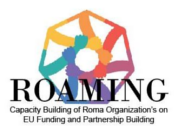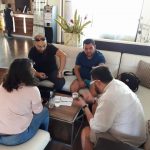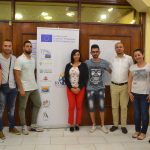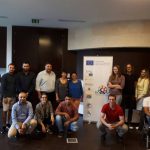Laboratories for European Roma Initiatives
Laboratories for European Roma Initiatives will be organized within 6 partner organizations (in Montenegro, Serbia, Albania, Kosovo, Macedonia, Bosnia and Herzegovina). They will be attended by various representatives of civil society organizations who will have the task to come up with high-quality ideas for Roma inclusion projects in an open conversation and productive joint work.
“European Roma Projects Lab” is aimed to increase the interest of local and national Roma organizations because it is supposed to be the hub for Roma organizations to discuss together about the priorities their community has and the ways in which they could make joint initiatives to advocate for better legislative, but also plan project that could be financed from direct EU funds.
Following the training course and internships, Project Labs were organized and the partner organizations engaging various CSO representatives in an open brainstorming and carefully facilitated process generated ideas for advocacy projects on Roma inclusion.
The Project Lab is a thematic workshop organized during 2 working days around the following topics:
(1) working against discrimination of Roma
(2) social inclusion of Roma youth, and
(3) sustainable development of Roma CSOs
CSO representatives met to discuss original ideas, agree on an joint idea and new ways of looking towards Roma advocacy initiatives in the context of EU Integration process, generated concrete advocacy proposals for Roma inclusion that can be implemented on national level in each country participating in the project.
The labs engaged at least 12 CSO representatives selected by the partners. Labs gathered representatives of organizations with experience and expertise in Roma Inclusion matters.
The realization of the “European Roma Initiatives Labs” was fully implemented by partner organization.
Advocacy Projects and Initiatives are practical initiatives to be implemented on local and national level, from the CSOs participating in the “European Roma Initiative Labs” after the Lab.
As part of their advocacy plans, each group had to implement one advocacy initiative in their country using EU funding possibilities and also their partnership building capacity developed during their mobility in Brussels. The advocacy initiatives will be organized on national level tackling the challenges of the Roma minority in the context of Euro integration process, in particular in adoption of the EU aquis, and will focus on influencing the public opinion on national and local level, or involvement in policy making process related to EU integration and EU reforms.
It is expected to come with an output – an advocacy project or advocacy plan composed of concrete advocacy actions and proposals on how to further increase the involvement and role of Roma CSOs in advocacy in a given country.
The advocacy actions will additionally involve more CSOs, as well as the European civil society umbrellas which in line with the follow up of the study visit will provide guidance and ideas on
- How to advocate using the EU standards and acquis as an argument and
- Which good practices from Europe can be applied locally and nationally?
The advocacy initiatives will be designed by the members of the “European Roma Initiative Labs”, and supported by the participants taking part in Brussels’ motilities. It is expected to apply variety of methods like campaigns, round tables, presentations within Parliament commissions and similar. All the project partners will provide their expertise in supporting the realization of the advocacy initiatives. The representative of the partner organization who took part in the motilities in Brussels is expected to be fully available and contribute to the labs.
The workshop was composed of 90 minute sessions, four sessions a day plus activities after dinner as envisaged in the original agenda. Trainers with extensive experience in the field of EU funding, Roma Advocacy, WB EU Integration and Capacity Development delivered the envisaged sessions.
Non-formal education was used as a key methodology in this training. The work focused to imply learning trough providing experts input, sharing experiences, joint work, group work and discussions. Trainers used presentations, elaboration of concepts and introductions. Active methods used contained simulations of given situations, working in groups, panel discussions, tips & tricks and energizers.
The training was designed to boost participant knowledge, increase motivation and produce a clear output to be later used for joint initiatives.
Conclusions from LABs
What is the solution that the Roma are no longer a marginalized minority? What can we do for Roma families in order to avoid discrimination and raise the willingness of vulnerable groups to participate with equal opportunities in the different areas of life?
For some, the answer comes from the co-operation with international institutions, with the EU and other international organizations in support of Roma rights. It should be the way to solve the problems we face every day. Through this, we know that one of the most important things is to give information about our history, our language, and our roots. The knowledge of Roma history and culture can help build a better sense of coexistence in society. The EU can promote a cultural initiative to disseminate this information about Roma culture and Roma language and tradition at the national level.
Participants in each country designed the “Problem Three” in which they assessed the reasons and consequences of the problem, as well as objectives. Examples bellow.
Problem: Lack of capacities to influence public policies
Reasons identified jointly:
– Lack of adequate education both in quantity and quality for reaching level of being influential;
– Discrimination in many fields of daily life;
– Very low interest in the R&E community to take part in decision making processes;
– Internal disagreements and misunderstanding mostly in the CS leadership;
– Lack of capacity to start processes of influence;
Consequences identified jointly:
– Being used at every elections and votes of the community are bought;
– Not being able to advocate for necessary changes for the community;
– R&E continuously discriminated and ignored both from individuals and institutions;
– Number of policies and programs designed not to serve the R&E or sometimes against the interest of the most marginalized and poor communities;
– Initiatives are not being taken seriously into consideration;
Problem: Lack of educated and capable Roma Youth cadre to commit for improving the situation of Roma
Objectives identified:
- Establishing a group of 10 politically capable Roma ready to enter political challenges in the interest of the Roma community;
- Establishing a group of 20 Roma with very well developed leadership capabilities as communication skills, project management, advocacy, lobby, community organizing, academic English, courage and self-confidence for entering in challenges in the interest of the Roma community;
- Establishing Roma Intellectual Political organization consisted of competent young Roma who will influence everyday politics.
Participants identified most useful tools for advocating for Roma issues. The proposed guidelines list the following recommendations:
- Effective mobilization of the community;
- Increasing awareness of the community about the importance of the problems they are facing, detailed information related to the problem and potential approach for reaching a change;
- Increasing the awareness of the community for supporting change makers;
- Establishing a system/mechanism to ensure accountability and credibility of future Roma representatives in national ad local organizations (partisan and non-partisan)
- Request of transparency;
- Make aware the institutions for the Roma problems;
- Building bridges between political parties and Roma NGOs;
- Ensure support of key players.





